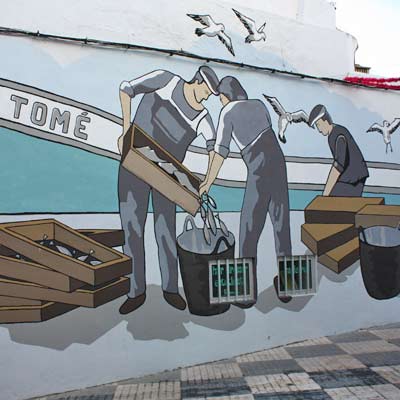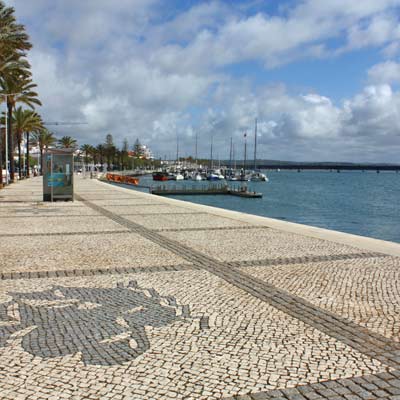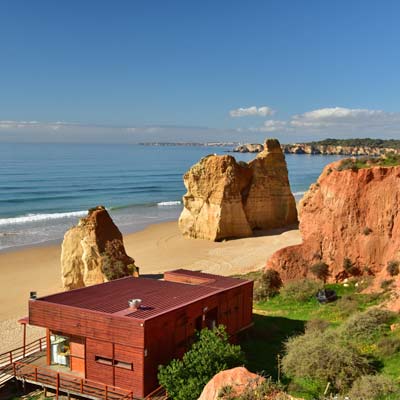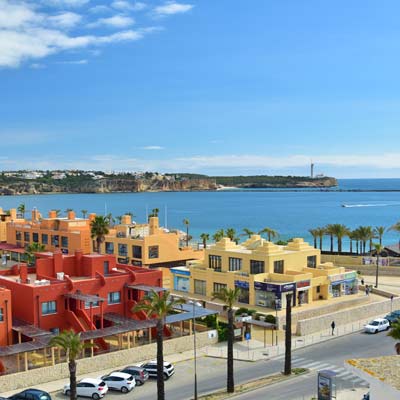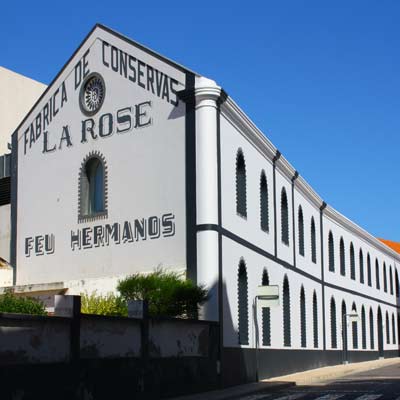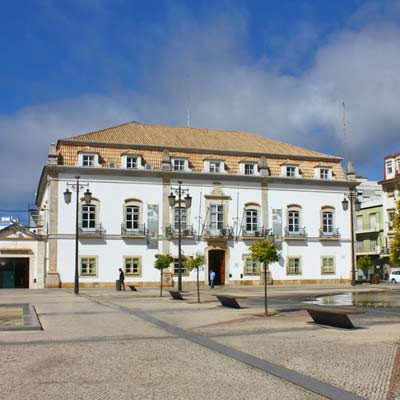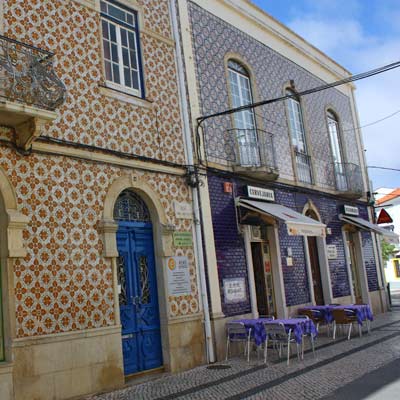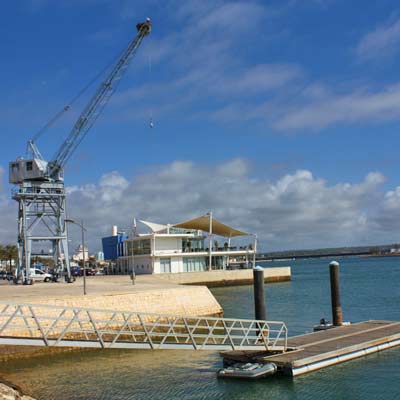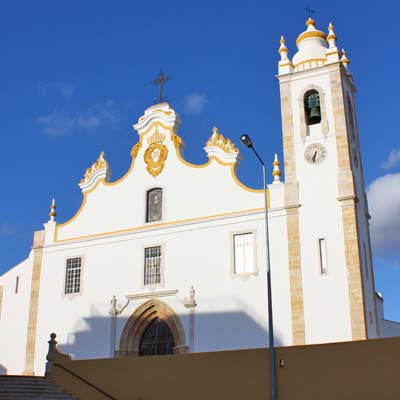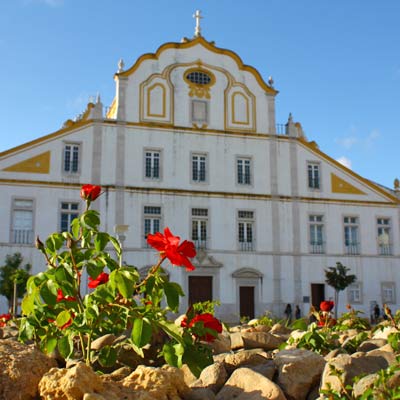Algarve-Tourist.com
The best independent guide to Portimão
Algarve-Tourist.com
The best independent guide to Portimão
Portimão Portugal - An Algarve Tourism Guide for 2026
Portimão is the largest city in the western Algarve, a bustling port with a proud industrial heritage that sets it apart from the typical resort towns. While tourism now drives its economy, the city has never lost its authentic Portuguese character, offering a fascinating glimpse into the real Algarve that exists beyond the beaches.
The heart of the modern city is its beautifully transformed riverfront. The old fishing docks have given way to a scenic promenade that leads to the charming, tree-lined squares of the historic centre. It is here, in the many riverside restaurants, that Portimão’s heritage truly comes alive, with the aroma of freshly grilled sardines filling the air.
Visitors are drawn to Portimão for its fantastic shopping, its authentic dining scene, and its refreshingly local atmosphere. While the city provides this dose of real Portugal, its famous neighbour, Praia da Rocha, offers one of the Algarve's very best beach and resort experiences.
This guide will provide everything you need to discover Portimão, helping you make the most of your visit to this vibrant and authentic Algarve city.
Highlights of Portimão
• A scenic walk along the Ribeirinha, the vibrant promenade that follows the Arade River.
• Discovering the historic heart of the city at the Praça da República and the magnificent Igreja do Colégio.
• Exploring the city's rich fishing heritage at the excellent Museu de Portimão.
• A day of retail therapy along the city's charming pedestrianised shopping streets.
• Admiring the beautiful Azulejo tile panels in the Jardim 1º de Dezembro, which depict key moments in Portuguese history.
Portimão and Praia da Rocha
For first-time visitors, it’s essential to understand the distinction between Portimão and Praia da Rocha. Although just 3km apart, they offer two completely different experiences. Praia da Rocha is a vibrant, modern resort built around one of the Algarve’s most spectacular beaches, with a focus on tourism. Portimão, by contrast, is a traditional Portuguese city on the banks of the Arade River, with a focus on local life, commerce, and culture.
Holidaymakers seeking a classic beach holiday - with golden sands, sea-view hotels, and a huge choice of bars and restaurants - will find their perfect base in Praia da Rocha. Visitors who prefer a more authentic Portuguese experience, with traditional dining, local shopping, and a more relaxed atmosphere, will be drawn to the city of Portimão.
Related articles: Praia da Rocha guide - Portimão beach guide
Portimão for a day trip
Portimão is a fantastic destination for a day trip, offering a refreshing dose of authentic Portuguese culture away from the busy beach resorts. The city’s historic centre is a delight to explore, with its handsome plazas, traditional cafes, and charming pedestrianised shopping streets.
A few hours is all that is needed to discover the main sights, and our suggested walking tour on the map below provides the perfect route for a half-day of exploration.
Begin at the tour at the Museu de Portimão (1) to learn about the history and heritage of the city. Wander from the museum up along the Ribeirinha (2) (the old harbourfront) to the Jardim Visconde Bivar (3). This is an 800m walk and passes marinas, docks and possibly a moored pirate ship!
See the Jardim 1º de Dezembro plaza (4) with its tile paintings and stop for coffee and cake at the Pastelaria Arade (5). View the outside of the baroque Câmara Municipal de Portimão (city hall) (6)
Visit the Praça da República (7) and enter the Igreja do Colégio (8) with its austere interior. Head to the Nossa Senhora da Conceição (9), the main church of Portimao. Visit the Mercado de Portimão (10), the traditional morning market of Portimao. If shopping is your thing you could visit the modern Centro Comercial Aqua Portimão.
For lunch: Head to the traditional seafood restaurants around the cobbled streets of the Rua da Barca. Restaurants include; Taberna da Maré, Trinca Espinhas, Dona Barca or Forte e Feio, to try some delicious freshly grilled sardines or fresh fish.
This tour would take 2-3 hours, depending on how long was spent in the museum or taken for lunch!
So why have a holiday in Portimao?
Though Portimao is significantly larger than Praia da Rocha, it offers a more low-key and calmer holiday destination. Portimão has an all-round relaxed atmosphere, and unlike Praia da Rocha, its pleasant pedestrianised shopping streets are not crammed with foreigners. The restaurants and cafes of Portimão are geared towards the Portuguese, selling more traditional meals at much better value.
Portimão also has excellent public transport connections, with both bus and rail services connecting the city with the entire western Algarve region. For that reason, people looking for a multi-city/touring holiday might wish to consider Portimão over Praia da Rocha.
Portimão Appearance
Portimao has a pretty harbour front and historic centre but it is a major city, without the Portuguese charm of many other Algarve destinations. Many of the apartment blocks, particularly on the outskirts of the city, date back to the 1980s and have a tired or worn appearance. It should be said that Portimão remains perfectly safe as a holiday destination, but it’s just not full of gleaming white hotels, ultra-modern apartments, or traditionally painted houses.
Sights of Portimão
The Museu de Portimão
The Museu de Portimão celebrates the city’s primary industry during the 19th and 20th centuries: sardine processing. The museum is housed in the La Rosa, one of the largest factories of the city, which closed in the 1980s. Part of the museum consists of the restored processing lines, while the remainder contains exhibits detailing the regional history. €3 entry for a fascinating museum.
Nossa Senhora da Conceição
The Nossa Senhora da Conceição is the principal church of Portimão, and is positioned on the highest point of the city. The façade of the church follows that of a simplistic 18th century Manueline styling, and does not reflect the actual age of the church. The Nossa Senhora da Conceição was originally constructed in 1470 and closely resembled the grand gothic Batalha Monastery ,but as with much of Portimao, was severely damaged by the 1755 earthquake. The only remaining gothic feature is the main portal, while inside are decorative Azulejos tile paintings.
Igreja do Colégio
Igreja do Colégio was the church and educational centre for the Jesuits, and is the largest church in the Algarve. The interior is sparse and plain following the belief of the Jesuits. The entire complex dates from the 17th century and was funded by a local businessman, Diogo Gonçalves, whose one condition for the construction was that he was buried in the church.
Convento de São Francisco
The Convento de São Francisco, is a 16th-century Manueline styled Franciscan convent, which has sadly degraded into unsafe ruins that have no public to access. The convent was damaged by the 1755 earthquake and left to decay after the dissolution of religious orders in 1834.
Portimão Day trip and Ferragudo
A day trip to Portimão could be combined with a visit to Ferragudo, which lies on the opposite side of the Arada River. Ferragudo is a traditional Portuguese fishing village, and the surrounding coastline is lined by beautiful beaches. During the summer a ferry crosses the river and connects Portimão to Ferragudo.
Related article: Day trip to Ferragudo
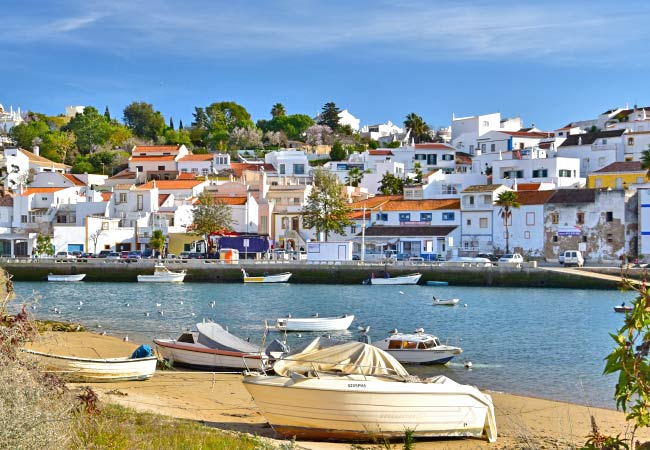
Ferragudo is a typical Portuguese fishing village
Portimao and day cruise to Silves
Further up the Arada River is Silves, the ancient capital of the Algarve. Silves contains an imposing castle, heavily fortified walls and a delightful historic centre, which is a joy to explore. Silves can be reached by bus, but a much more memorable journey is by tour on one of the boats which depart from the northern end of the Ribeirinha.
Related article: Guide to Silves
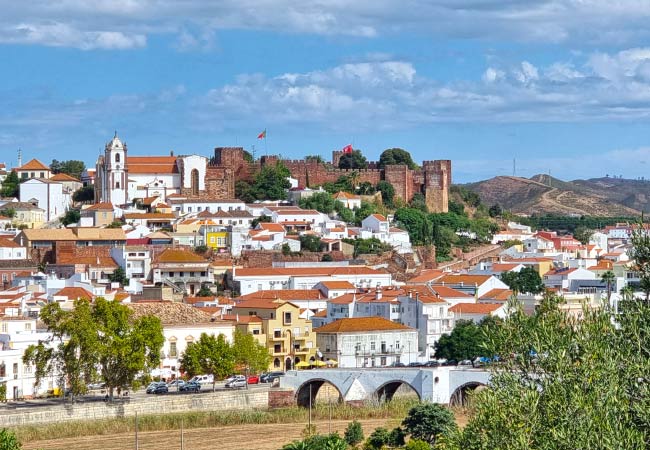
Day trips from Portimão
Portimão’s excellent public transport connections mean that the entire western Algarve can be easily reached via convenient, inexpensive bus or train services. The two most popular day trips are to the towns of Lagos and Silves.
Silves served as the Algarve region’s ancient capital, and the tourist attractions here reflect its rich and extensive history. The famous and imposing red-brick castle is one of the largest in The Algarve, and the town’s solid boundary walls encircle the historic centre.
Lagos, in contrast, is a much larger city and was the centre for Portugal’s 14th century age of exploration. With a plethora of symbolic historical attractions including a fort, ancient city walls, decorative churches, and even a former slave market, Lagos is far from short of fascinating discoveries.
Within walking distance of the city are also the highly-weathered cliffs of the Ponta da Piedade, regarded as one of the best natural features of the Algarve and indeed Portugal. Reaching as high as 20 meters in some places, the rocks feature a series of caves and caverns, many of which can be explored by boat.
Related articles: Lagos introduction – Silves introduction
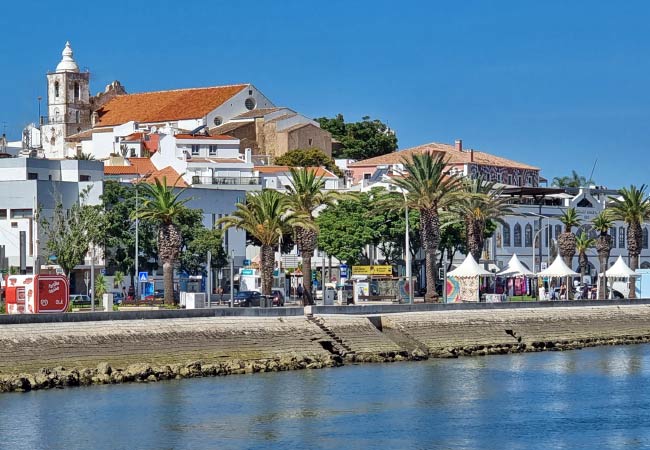
Lagos combines beaches, history and enjoyable activities
Portimão as a transport hub
Portimão is the largest city of the region and is a major hub for public transport. The train station is conveniently located to the north of the city centre (GPS: 37.144, -8.537) and is connected to the Algarve regional railway, with services to the west (Lagos) or the east (Faro, Tavira, Vila Real de Santo António). At Tunes (and Faro) there are connections to express services to central and northern Portugal. All services can be seen on the CP (Comboios de Portugal) website:
www.cp.pt/passageiros/en
Vamus is the regional bus company of the Algarve and provides services to Silves, Lagos, Albufeira, and Vilamoura. Rede Expressos is the intercity bus company with links covering the whole of Portugal. More information about services from Portimao can be seen on their respective websites:
vamusalgarve.pt
www.
(links open new tabs)
Note: The departure location of the intercity buses has moved to the Rua da Abicada bus station, north of the train station (GPS: 37.14684, -8.53564). The regional buses services depart from the Largo do Dique station (GPS: 37.13694, -8.53538), which is near the northern side of the Ribeirinha. The two bus stations are separated by 1.5km (and a walk of 2km). Always confirm the departure location of your bus when purchasing the ticket.
Our most popular articles for Portimão and the Algarve
Expert Insight: These guides are curated by Philip Giddings, a travel writer with over 25 years of local experience in Portugal. Since 2008, Phil has focused on providing verified, on-the-ground advice for the Algarve region, supported by deep cultural ties through his Portuguese family. Read the full story here.
